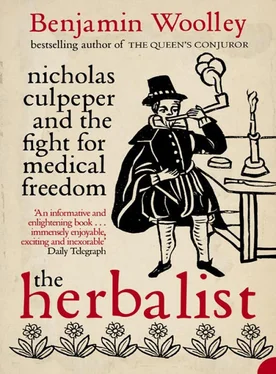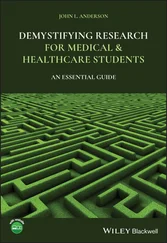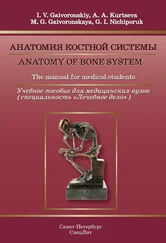Anticipating future generations of students, Nicholas may even have grown his own. He was certainly well acquainted in later life with ‘yellow henbane’, a variety of tobacco that he thought originated in Brazil and was now widespread in England. He knew what it looked like, and where it grew. He described the saffron juice derived from the leaves as an effective expectorant for ‘tough phlegm’. He also later noted in one of his medical books that the bruised leaves ‘applied to the place aggrieved by the king’s evil’ would alleviate discomfort. ‘Indeed,’ he added, ‘a man might fill a whole volume with the virtues of it.’ 49Given the context, this must surely have been a mischievous reference to royal disapproval of the domestic weed. 50In 1619, James, under pressure from the settlers in Virginia and enticed by the prospect of greater revenues, issued a proclamation banning the cultivation of tobacco in England (which, being domestically grown, was free of excise duties and impositions). His grounds were that the ‘Inland plantation’ had allowed tobacco to ‘become promiscuous, and begun to be taken in every mean Village even amongst the basest people’, and because ‘divers persons of skill and experience’ had told him that the English variety was ‘more crude, poisonous and dangerous’ than the Virginian. The same disapproving policy continued into the reign of Charles I, who took further measures to monopolize its importation and to license its sale, on the grounds that it was ‘taken for wantonness and excess’. 51
Nicholas evidently saw smoking as a badge of the anti-authoritarianism that was to define his career, and it seems the two were combined into an intoxicating mix in his Cambridge days. However, it was another act of rebellion that was to have the most decisive influence on his forthcoming career.
The story is related in the most melodramatic style in a short, anonymous memoir concerning Nicholas that appeared in the introduction to a posthumous edition of one of his works:
One of the first Diversions that he had amongst some other smaller transactions and changes, none of his Life proving more unfortunate, was that he had engaged himself in the Love of a Beautiful Lady; I shall not name her for some reasons; her Father was reported to be one of the noblest and wealthiest in Sussex. 52
The identity of the lady remains a mystery. She had a personal estate worth £2,000 and a private income of £500 a year, according to the memoir, figures consistent with the wealth of, say, the daughter of a rich baronet, such as Sir John Shurley (1569–1631). Sir John was the owner of the manor of Isfield, and had an extended family that included a few possible candidates. 53If the lady belonged to the Shurley clan, it is easy to see why Nicholas kept the love affair secret. Sir John was William Attersoll’s patron. Attersoll dedicated two of his books to Sir John, and became a beneficiary of the baronet’s will in 1631 – the time that the adolescent intensities of Nicholas’s illicit love affair presumably came into flower in the woodlands around Isfield, and just before they were interrupted by his departure for Cambridge.
Nicholas was no match for a rich member of one of the most ancient and respected families in the county. He may have been a Culpeper, but he was from an inferior branch. The very suggestion of such a relationship would have caused his grandfather great embarrassment. ‘Parents have often too severe eyes over their Children’, as the memoir observed, and Nicholas knew only too well that Attersoll would bring down the wrath of an Old Testament God upon such a union. So the couple decided upon their ‘Martyrdoms’ – an elopement. ‘By letters and otherwise’ they plotted to meet in Lewes, where they were to be married in secret ‘and afterwards for a season … live privately till the incensed parents were pacified’.
On the appointed day, probably some time in 1633 or early 1634, the lady and one of her maids hid among their skirts ‘such Rich Jewels and other necessaries as might best appertain to a Journey’, while Nicholas pocketed the £200 left over from the money his mother had given him for his education at Cambridge. The Romeo set off by coach, the Juliet by foot, to rendezvous at the chapel in Lewes, where a priest waited to perform their secret nuptials.
As he approached his destination, news reached Nicholas of a providential intervention. As his bride-to-be and her companion were making their way across the Downs they were ‘suddenly surprised with a dreadful storm, with fearful claps of Thunder surrounded with flames of Fire and flashes of Lightning, with some of which Mr Culpeper’s fair Mistress was so stricken, that she immediately fell down dead’. A family friend passed by Nicholas’s coach as he received the news and took the distraught young man to the rectory at Isfield. The unexpected appearance of her son filled Nicholas’s mother with joy, until she became aware of the circumstances that had brought him there. The shock, according to the memoir, struck her down with an illness from which she would never recover. 54
Nicholas’s relationship with Attersoll was also terminally injured. It was yet more evidence of the young man’s irredeemable rebelliousness. ‘If we have warned them, and they would not be warned,’ Attersoll thundered in one of his biblical commentaries, ‘if we taught and trained them up in the fear of God, which is the beginning of wisdom, and they have broken the bands asunder, and cast the cords of duty and discipline from them, we may comfort our selves as the Minister doth, when he seeth his labour is spent in vain.’ 55Attersoll disinherited his ward, and gave up on his religious education.
Nicholas left Cambridge in a state of ‘deep melancholy’. He could not stay in Sussex either; so, like many others who find themselves in need of a fresh start and a new life, he set off for that refuge of the dispossessed: London, where for a while he disappears from the historical record and our story, as others take centre stage.
* This and the following extracts introducing each chapter are taken from Culpeper’s The English Physitian.
Конец ознакомительного фрагмента.
Текст предоставлен ООО «ЛитРес».
Прочитайте эту книгу целиком, купив полную легальную версию на ЛитРес.
Безопасно оплатить книгу можно банковской картой Visa, MasterCard, Maestro, со счета мобильного телефона, с платежного терминала, в салоне МТС или Связной, через PayPal, WebMoney, Яндекс.Деньги, QIWI Кошелек, бонусными картами или другим удобным Вам способом.












